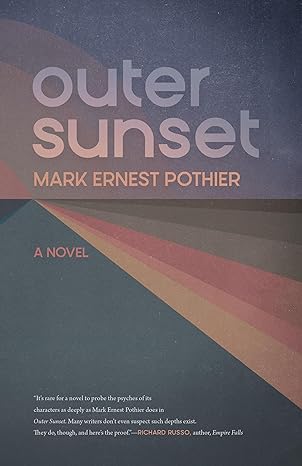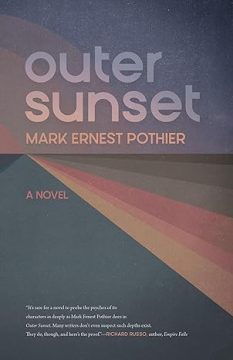From falling asleep in his English lectures to the release of his nationally acclaimed debut novel “Outer Sunset,” author Mark Pothier had quite the story to share in Main Hall on Tuesday, Oct. 3.
Professor of English David McGlynn’s creative writing class had just finished reading “Outer Sunset,” so naturally, he introduced them to Pothier. Despite having only met in-person the day of the reading, the two have bonded with each other through email correspondence for the past fifteen years. Just before the lecture, McGlynn’s creative writing class got to meet Pothier and have a private Q&A session separate from the reading. I was one of the students in that class, where Pothier took his audience much more deeply into his career as a writer and journey to “Outer Sunset” than at the lecture.
“Outer Sunset” was the product of Pothier’s very first writing workshop in his undergraduate years. He attended a liberal arts school, where he studied art, theater and, of course, English. It was in one of these English classes that his professor assigned the prompt: take something that resonates with you and write it in any given point of view. It was easy enough for Pothier to choose; on just one occasion, his father, who was highly averse to physical affection, hugged him out of the blue. Despite the impression the experience left on him, Pothier thought the first draft of this story, which he wrote from the son’s point of view, felt bland, like it was missing some spark. It was only when he rewrote it through the father’s eyes that he found that spark. He humorously recalled the division the story caused in his class; half of them, including the professor, hated it, but half thought he was on to something – and so did young Pothier himself.
After his rejection from several graduate programs – we shouldn’t get too down on ourselves if it happens to us, as it’s just a part of the college experience, he joked – Pothier wound up at a state school in San Francisco, where he still lives to this day. The workload forced his creative writing to take a backseat, including his one-and-done, class-dividing short story that would one day become the first chapter of “Outer Sunset.”
Years later, on a whim, Pothier submitted that short story to a fiction contest hosted by the Chicago Tribune. When he got the call that he had won, it came as a shock; he had completely forgotten about it. As his prize, the Tribune flew him out to Chicago, where he was a guest of honor at a celebratory banquet for his talent.
“I was not as much of a lost cause as I thought I was,” Pothier joked.
The path in front of Pothier seemed laden in gold. Unfortunately, the first work he would write following his success with the Tribune flopped. Years would pass before Pothier would return to “Outer Sunset.” In the meantime, he would settle down and start a family. As his children aged, however, he found that his hectic life had slowed down. With this new time on his hands, he submitted the first chapter of “Outer Sunset” to Kindle, which was new at the time and calling for short works of fiction to get their platform off the ground. When he found out that 7,000 electronic copies had been sold, he knew that he had to return to writing.
“[‘Outer Sunset’] started living,” Pothier explained. “The voice of [‘Outer Sunset’] kept coming back to me.”
The process was rather difficult. He had his fair share of anthropological research to do to preserve the manuscript’s authenticity, including repeatedly consulting with Slavic members of his choir to ensure he was not emulating stereotypes in his Ukranian character. Even once he had finished, he had difficulty securing a publisher. Once he did, COVID-19 wracked the world, making the time to market to bookstores less-than-ideal. However, after the world opened back up in the spring of 2023, “Outer Sunset” and Pothier’s dream of authoring a successful book of fiction would finally come to fruition.
At the reading, Pothier narrated two scenes with great expression: the opening scene and one of the main character bonding with a student over shared misery. Although each character’s voice was distinct on paper, hearing the dialogue aloud from the author himself showed his audience his own interpretation. Despite this, however, Pothier made clear later in his Q&A session that he does not like to establish his authorial voice at readings; he believes it is something each person should interpret on their own. He also answered questions about “Outer Sunset,” the publishing process and gave tips and tricks on how to pursue a writing career.
At the end of said Q&A, Pothier offered advice to his audience: read. Read as much as you can, and once you feel confident to write on your own, make sure it comes from the heart.
“Be patient with yourself and with your writing,” Pothier advised. “Be as authentic as you can possibly be; be true. Be true to yourself.”
Pothier’s most resonant message to the young writers in that room is forever inscribed on the first page of my copy right under my name and right next to his: “Keep on writing.”


